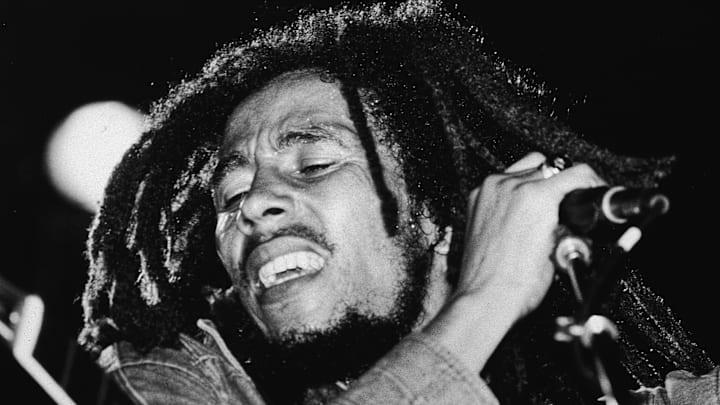Born Robert Nesta Marley, Bob Marley was a Jamaican musician and cultural icon who is best known for his contributions to the development of reggae music and his advocacy for peace and social justice. He was born on February 6, 1945, in Nine Mile, Jamaica, and he passed away on May 11, 1981, in Miami, Florida, at the age of 36. Bob Marley is often referred to as the "King of Reggae." For the handful of people who may dismiss that status, they must still admit he played a significant role in popularizing reggae music, both in Jamaica and internationally.
His music is characterized by its distinctive rhythm, message-driven lyrics, and the use of the Rastafarian religion's themes. Of course, Marley did not solely "invent" reggae. In fact, the term itself has origins in the Toots and the Maytals song, "Do the Regga," releawed in 1968. Still, Marley's own musical career became huge, and it began in 1963 with the group known as "The Wailers" (originally called "The Teenagers"), which included Peter Tosh and Bunny Wailer.
Bob Marley: Legendary artist, legendary sales
Record sales are among the reasons Bob Marley is seen as the main icon of reggae music. As Jamaica Observer reported in October of 2023: "Legend, the best-selling reggae album of all time by Bob Marley and The Wailers, entered its 800th week in Billboard magazine's 200 chart last week. Released in 1984 by Island Records, Legend is only the second album to accomplish this feat. The other is Dark Side of The Moon by British band Pink Floyd, which came out in 1973."
Ever since Bob Marley & the Wailer's albums like Catch a Fire and Burnin' came out, Bob Marley's music has, well, spread like a fire, indeed. This was partly due to his merging of music, a variety of beliefs, and his willingness to sometimes have social commentary in his songs. At the same time, the music itself was often extremely catchy, full of memorable music and lyrics. One of The Wailers' most famous songs, "No Woman, No Cry," was included in their album Natty Dread." Some of Bob Marley's most iconic albums include the aforementioned Legend," Rastaman Vibration (which contains the iconic song "War"), Exodus, and Kaya. His music often carried messages of hope and empowerment.
Rastafrianism, and political and social activism
Bob Marley's music is also often associated with Rastafarianism. He was a devout Rastafarian, and his faith played a significant role in his music and life. Rastafarianism is a religion that developed in Jamaica and is rooted in the belief that Emperor Haile Selassie of Ethiopia was the Messiah (nevertheless, one needn't be a Rastafarian, or religious at all, to enjoy Bob Marley's music or that of any reggae musical act).
Rastafarians also place a strong emphasis on social justice, African pride, and the use of marijuana in religious rituals. Marley was also deeply committed to social and political causes. He used his music to advocate for peace, love, and unity and was a prominent voice in the struggle for racial equality in Jamaica. One of his most famous songs, "Get Up, Stand Up,"
became an anthem for certain political movements.
Legacy and tragic death
Bob Marley's influence on music and popular culture is enduring. He is an iconic figure in reggae and remains an important symbol of the struggle for justice, peace, and unity. However, Marley's life was cut short when his health began to deteriorate due to melanoma, a form of skin cancer. He continued to perform despite his illness.
He passed away on May 11, 1981, at the age of 36. Bob Marley's music and message continue to resonate with people from all walks of life, and his legacy endures through his timeless songs and the cultural impact he made during his relatively short but impactful life. In fact, people sometimes say “One Love” as a greeting, and that was a Bob Marley song.
Random facts about Mr. Marley
- Marley had some of his biggest international breakthroughs in 1975, thanks to Eric Clapton's version of his song "I Shot the Sheriff" hitting the charts, and the success of "No Woman, No Cry."
- In the late 1970s, Marley made a controversial decision to relocate to England, partly due to political turmoil. Specifically, it was no doubt partly because there was an infamous assassination attempt on him in 1976! In other words, not everyone was a Bob Marley fan.
- Though Marley is surely the biggest figure in reggae, let's not forget there were other famous reggae stars. The musician and singer-songwriter Jimmy Cliff began his career at around the time Bob Marley got started. Also, Dennis Brown was considered by Bob Marley to be the greatest reggae singer, and even Damian Marley (Bob's son) once stated, "If they say that Bob Marley is the king of reggae music, then Dennis Brown is the crown prince."
Derrick Morgan also helped popularize Jamaican music at the time of Bob Marley, even though Marley was the biggest breakthrough artist on an international scale.
Here is a Bob Marley song that seems a bit underrated:
